WordPress Vulnerability Report: August 2021, Part 2
Vulnerable plugins and themes are the #1 reason WordPress websites get hacked. The weekly WordPress Vulnerability Report powered by WPScan covers recent WordPress plugin, theme, and core vulnerabilities, and what to do if you run one of the vulnerable plugins or themes on your website. Each vulnerability will have a severity rating of Low, Medium, High, or Critical.

Vulnerable plugins and themes are the #1 reason WordPress websites get hacked. The weekly WordPress Vulnerability Report powered by WPScan covers recent WordPress plugin, theme, and core vulnerabilities, and what to do if you run one of the vulnerable plugins or themes on your website.
Each vulnerability will have a severity rating of Low, Medium, High, or Critical. Responsible disclosure and reporting of vulnerabilities is an integral part of keeping the WordPress community safe.
As one of the largest WordPress Vulnerability Reports to date, please share this post with your friends to help get the word out and make WordPress safer for everyone.
Get SolidWP tips direct in your inbox
Sign up
Get started with confidence — risk free, guaranteed
WordPress Core Vulnerabilities
1. Sitewide Notice WP

Plugin: Sitewide Notice WP
Vulnerability: Authenticated Stored XSS
Patched in Version: 2.3
Severity Score: Low
2. Business Hours Indicator

Plugin: Business Hours Indicator
Vulnerability: Authenticated Stored XSS
Patched in Version: 2.3.5
Severity Score: Low
3. Bold Page Builder

Plugin: Bold Page Builder
Vulnerability: PHP Object Injection
Patched in Version: 3.1.6
Severity Score: Medium
4. ShareThis Dashboard for Google Analytics

Plugin: ShareThis Dashboard for Google Analytics
Vulnerability: Reflected Cross-Site Scripting (XSS)
Patched in Version: 2.5.2
Severity Score: High
5. StoryChief

Plugin: StoryChief
Vulnerability: Reflected Cross-Site Scripting (XSS)
Patched in Version: 1.0.31
Severity Score: High
Plugin: StoryChief
Vulnerability: Authenticated Stored Cross-Site Scripting (XSS)
Patched in Version: 1.0.31
Severity Score: Low
6. WP LMS

Plugin: WP LMS
Vulnerability: Unauthenticated Arbitrary User Field Edition/Creation
Patched in Version: 1.1.5
Severity Score: Medium
7. VDZ Google Analytics or Google Tag Manager / GTM

Plugin: VDZ Google Analytics or Google Tag Manager / GTM
Vulnerability: Authenticated Stored XSS
Patched in Version: 1.6.0
Severity Score: Low
Plugin: VDZ Google Analytics or Google Tag Manager / GTM
Vulnerability: Authenticated Stored XSS
Patched in Version: 1.4.9
Severity Score: Low
8. Cooked

Plugin: Cooked
Vulnerability: Unauthenticated Reflected Cross-Site Scripting (XSS)
Patched in Version: 1.7.9.1
Severity Score: Medium
9. Email Encoder – Protect Email Addresses

Plugin: Email Encoder – Protect Email Addresses
Vulnerability: Reflected Cross Site Scripting
Patched in Version: 2.1.2
Severity Score: Medium
10. SMS Alert Order Notifications – WooCommerce

Plugin: SMS Alert Order Notifications – WooCommerce
Vulnerability: Authenticated Cross Site Scripting
Patched in Version: 3.4.7
Severity Score: Low
11. HM Multiple Roles

Plugin: HM Multiple Roles
Vulnerability: Arbitrary Role Change
Patched in Version: 1.3
Severity Score: Critical
12. WP Customize Login

Plugin: WP Customize Login
Vulnerability: Authenticated Stored Cross-Site Scripting (XSS)
Patched in Version: No known fix
Severity Score: Low
13. User Rights Access Manager

Plugin: User Rights Access Manager
Vulnerability: Access Restriction Bypass
Patched in Version: No known fix
Severity Score: Medium
14. JiangQie Official Website Mini Program

Plugin: JiangQie Official Website Mini Program
Vulnerability: Authenticated SQL Injection
Patched in Version: 1.1.1
Severity Score: Critical
15. Welcart e-Commerce

Plugin: Welcart e-Commerce
Vulnerability: Unauthenticated Information Disclosure
Patched in Version: 2.2.8
Severity Score: High
Plugin: Welcart e-Commerce
Vulnerability: Authenticated System Information Disclosure
Patched in Version: 2.2.8
Severity Score: Medium
16. Highlight

Plugin: Highlight
Vulnerability: Authenticated Stored Cross-Site Scripting
Patched in Version: 0.9.3
Severity Score: Low
17. Cookie Notice & Consent Banner for GDPR & CCPA Compliance

Plugin: Cookie Notice & Consent Banner for GDPR & CCPA Compliance
Vulnerability: Authenticated Stored XSS
Patched in Version: 1.7.2
Severity Score: Low
18. Pods

Plugin: Pods
Vulnerability: Multiple Authenticated Stored Cross-Site Scripting (XSS)
Patched in Version: 2.7.29
Severity Score: Low
WordPress Theme Vulnerabilities
A Note on Responsible Disclosure
You might be wondering why a vulnerability would be disclosed if it gives hackers an exploit to attack. Well, it is very common for a security researcher to find and privately report the vulnerability to the software developer.
With responsible disclosure, the researcher’s initial report is made privately to the developers of the company that owns the software, but with an agreement that the full details will be published once a patch has been made available. For significant security vulnerabilities, there may be a slight delay in disclosing the vulnerability to give more people time to patch.
The security researcher may provide a deadline for the software developer to respond to the report or to provide a patch. If this deadline is not met, then the researcher may publicly disclose the vulnerability to put pressure on the developer to issue a patch.
Publicly disclosing a vulnerability and seemingly introducing a Zero-Day vulnerability–a type of vulnerability that has no patch and is being exploited in the wild– may seem counterproductive. But, it is the only leverage that a researcher has to pressure the developer to patch the vulnerability.
If a hacker were to discover the vulnerability, they could quietly use the Exploit and cause damage to the end-user(this is you), while the software developer remains content on leaving the vulnerability unpatched. Google’s Project Zero has similar guidelines when it comes to disclosing vulnerabilities. They publish the full details of the vulnerability after 90 days whether or not the vulnerability has been patched.
How to Protect Your WordPress Website From Vulnerable Plugins and Themes
As you can see from this report, lots of new WordPress plugin and theme vulnerabilities are disclosed each week. We know it can be difficult to stay on top of every reported vulnerability disclosure, so the iThemes Security Pro plugin makes it easy to make sure your site isn’t running a theme, plugin or WordPress core version with a known vulnerability.
1. Turn on the iThemes Security Pro Site Scanner
The iThemes Security Pro plugin’s Site Scanner scans for the #1 reason WordPress sites get hacked: outdated plugins and themes with known vulnerabilities. The Site Scanner checks your site for known vulnerabilities and automatically applies a patch if one is available.
To enable the Site Scan on new installs, navigate to the Site Check tab on the Features menu inside the plugin and click the toggle to enable the Site Scan.
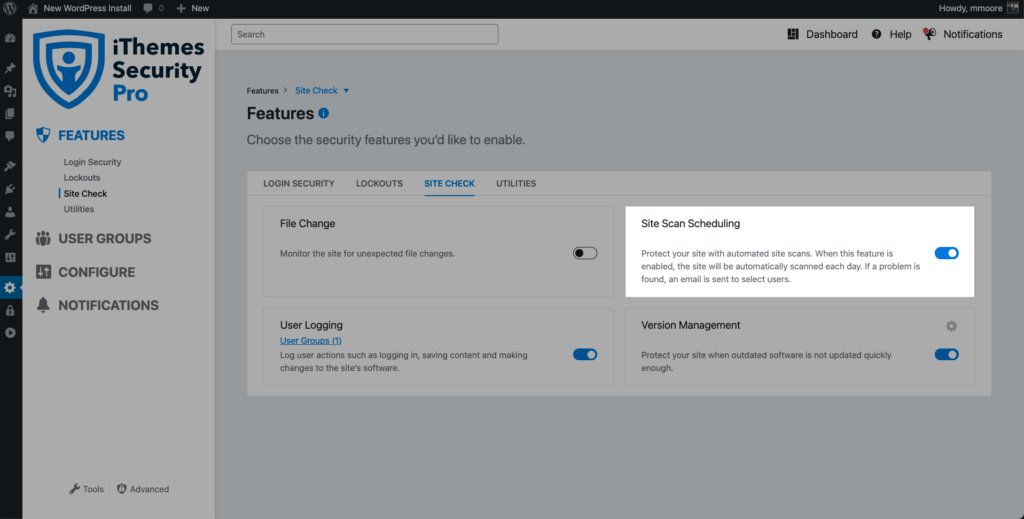
To trigger a manual Site Scan, click the Scan Now button on the Site Scan Security Dashboard card.
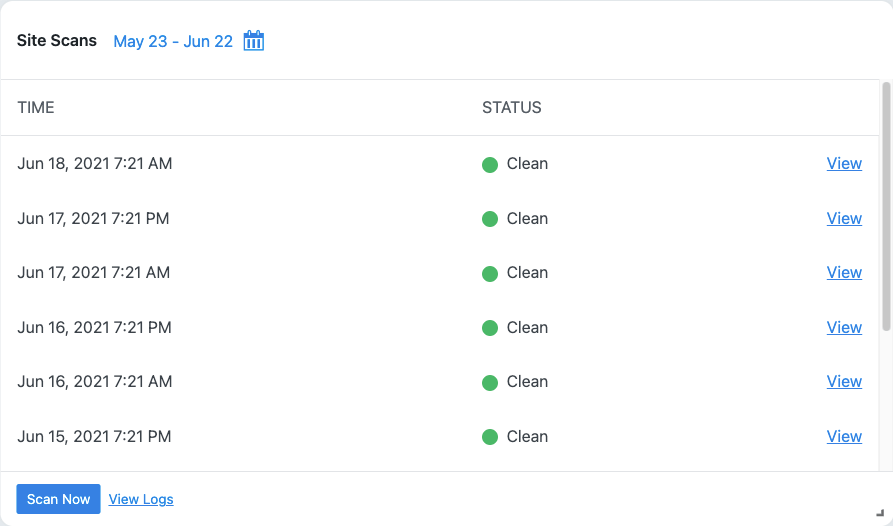
If the Site Scan detects a vulnerability, click the vulnerability link to view the details page.
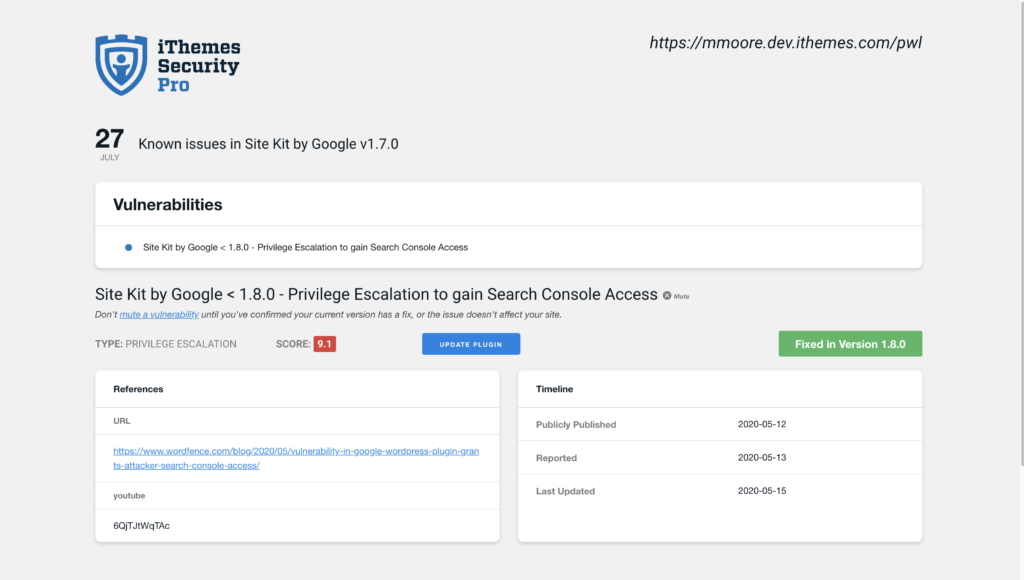
On the Site Scan vulnerability page, you will see if there is a fix available for the vulnerability. If there is a patch available, you can click the Update Plugin button to apply the fix on your website.
2. Turn on Version Management
The Version Management feature in iThemes Security Pro integrates with the Site Scan to protect your site when outdated software is not updated quickly enough. Even the strongest security measures will fail if you are running vulnerable software on your website. These settings help protect your site with options to update to new versions automatically if a known vulnerability exists and a patch is available.
From the Settings page in iThemes Security Pro, navigate to the Features screen. Click the Site Check tab. From here, use the toggle to enable Version Management. Using the settings gear, you can configure even more settings, including how you want iThemes Security Pro to handle updates to WordPress, plugins, themes, and additional protection.
Make sure to select Auto Update if it Fixes a Vulnerability box so that iThemes Security Pro will automatically update a plugin or theme if it fixes a vulnerability that was found by the Site Scanner.
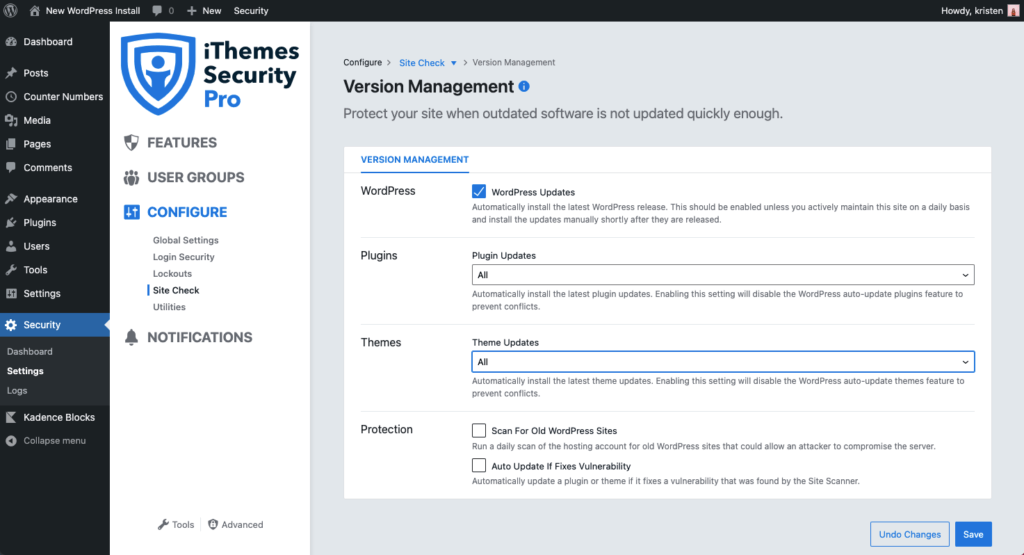
3. Get an Email Alert When iThemes Security Pro Finds a Known Vulnerability On Your Site
Once you’ve enabled Site Scan Scheduling, head to the Notification Center settings of the plugin. On this screen, scroll to the Site Scan Results section.
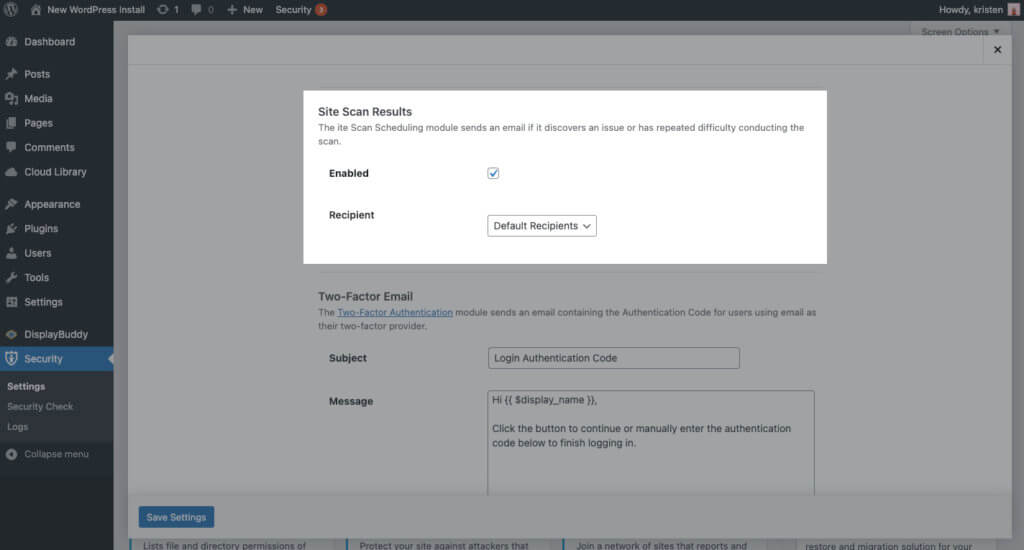
Click the box to enable the notification email and then click the Save Settings button.
Now, during any scheduled site scans, you’ll get an email if iThemes Security Pro discovers any known vulnerabilities. The email will look something like this.
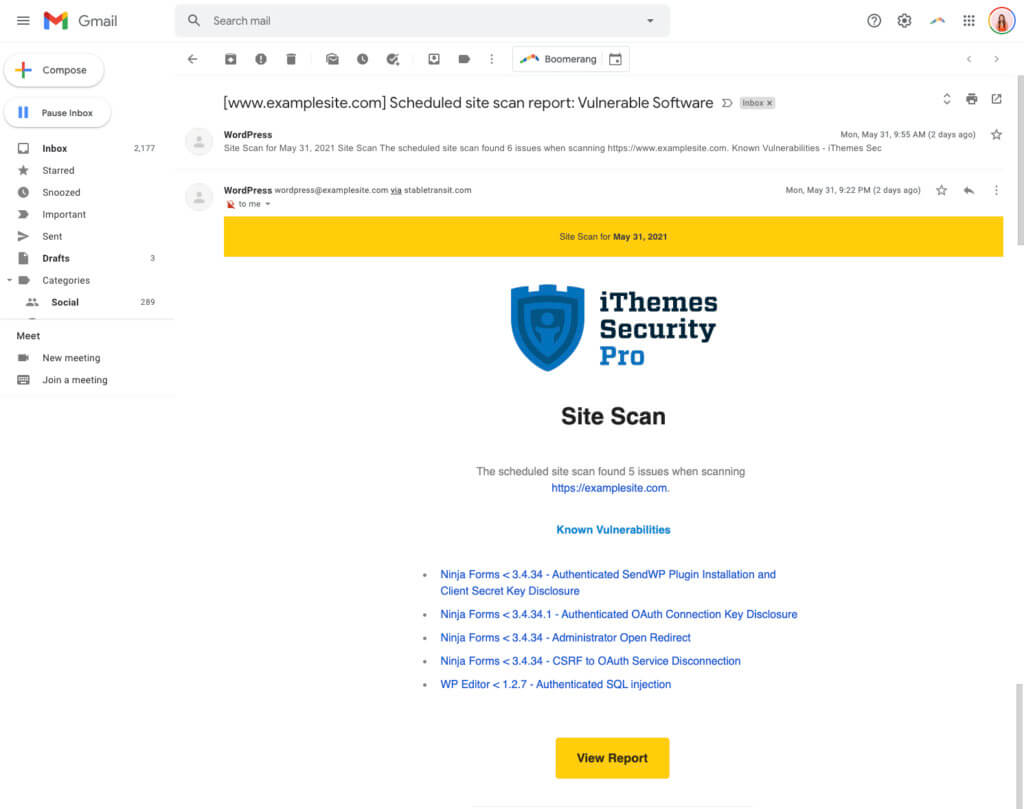
Get iThemes Security Pro and Rest a Little Easier Tonight
iThemes Security Pro, our WordPress security plugin, offers 50+ ways to secure and protect your website from common WordPress security vulnerabilities. With WordPress, two-factor authentication, brute force protection, strong password enforcement, and more, you can add an extra layer of security to your website.
Get iThemes Security Pro
Sign up now — Get SolidWP updates and valuable content straight to your inbox
Sign up
Get started with confidence — risk free, guaranteed